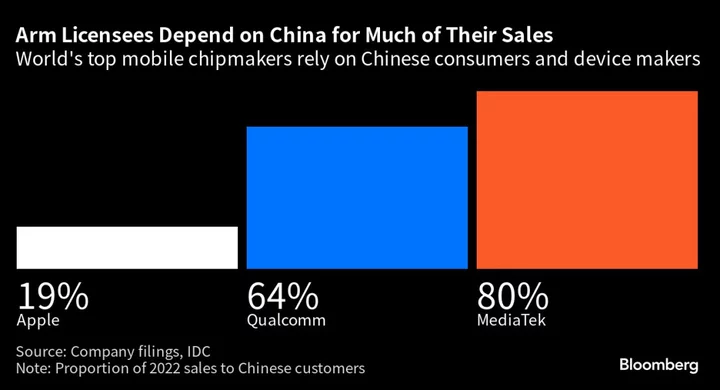Several key former employees from Arm Holdings Plc’s Chinese venture have started a chip design house with local government backing, adding to uncertainty in the British firm’s biggest market just weeks after it raised $5 billion in an initial public offering.
The departures from Arm China included the head of R&D, a regional head of sales and a government relations employee who is now chief executive officer of the new firm, Borui Jingxin, people familiar with the matter said. The two-and-a-half-year-old firm is backed by Shenzhen’s government and aims to raise capital and recruit engineers — including from Arm. Borui is also a major new Arm licensee and aims to devise chips for servers, said the people, asking to remain anonymous discussing confidential deals.
Arm — whose chip designs power most of the world’s mobile devices including Apple Inc.’s iPhone — is grappling with a US-Chinese conflict over technology that has uncertain implications for foreign operators. Now, several investors have told Bloomberg News they are concerned Borui could eventually divert revenue from the China venture, in part because of the uncertainty that’s surrounded the operation in past years.
The Borui defections mark the latest chapter in a turbulent history for Arm in the world’s largest semiconductor arena. After Japan’s SoftBank Group Corp. acquired Arm in 2016, it ceded majority ownership in China to local investors. SoftBank and Arm then ended up in a years-long dispute with the CEO of the China business, who was fired but refused to leave. SoftBank and Arm ultimately prevailed in ousting Allen Wu last year, though he continues to hold shares in Arm China via entities he controls.
Still, Arm’s standing in a market where it derives a quarter of its revenue is precarious. The British firm conducts business through a complex arrangement with powerful local and government-backed interests behind the venture, Arm Technology (China) Co. In a prospectus filed before its historic IPO, Arm acknowledged it doesn’t control the China unit and faces the risk of losing all control over the venture. Arm China in February laid off about 100 employees, most of them from the R&D team, and some of those have joined Borui, the people familiar with the matter said.
Borui’s business isn’t a threat to Arm China and rather it will benefit the venture by boosting revenue within the country, said other people familiar with the startup’s operations.
Read more: Arm Needed 3,500 Words to Explain Its China Risks Before IPO
A Borui Jingxin representative said in an e-mail it’s a customer of Arm China and doesn’t compete with or have any conflicts of interest with the venture. It said it designs chips for “cloud computing and edge controllers.” Arm China representatives didn’t respond to requests for comment, while spokespeople for SoftBank and Arm itself declined to comment.
Borui Jingxin is one of a plethora of startups backed by local governments that have sprung up as Washington works to hold back China’s chip development.
Its registered capital was boosted to 8 billion yuan ($1.1 billion) in February from a mere 45 million yuan previously, according to company database QiChaCha. The new funds came from two Shenzhen-based firms whose background was unclear but shared the same address and controlling shareholder, and a third entity owned by the state-owned assets regulator in the city’s Nanshan district. The Shenzhen government did not reply to emails and a phone call requesting comment.
Borui has started actively recruiting engineers. On recruiting site Zhipin.com, it’s offering senior engineers an annual package as high as 1.1 million yuan ($150,720). Its core team came from celebrated chip design firms and has two decades of work experience on average, according to the job posts.
And it’s actively seeking more local government support. In September, Borui’s Yang Bo and Jin Yongbin attended a meeting with officials from Shanghai’s Hongkou district, according to a post by the local government that identified them as founders and top executives. The post, which included a photo of the two executives at the meeting, was taken down and replaced days later with another online article that scrubbed any mention of Borui.
The government of Hongkou district didn’t respond to an emailed request for comment.
Current CEO Yang was previously in charge of Arm China’s government relations in the southern tech hub of Shenzhen before his departure in 2021. Jin, a senior vice president at Borui, oversaw regional sales before leaving in 2019, while newcomer William Liu joined this year after formerly supervising Arm China’s R&D effort, the people said.
Arm’s biggest customers include Apple, which relies on China for close to 20% of its revenue every year. Leading mobile chipmakers Qualcomm Inc. and MediaTek Inc. sell the bulk of their chips, built on Arm designs, to Chinese smartphone makers.
--With assistance from Ian King, Jane Zhang, Gao Yuan and Min Jeong Lee.
Author: Jane Lanhee Lee, Zheping Huang and Debby Wu

